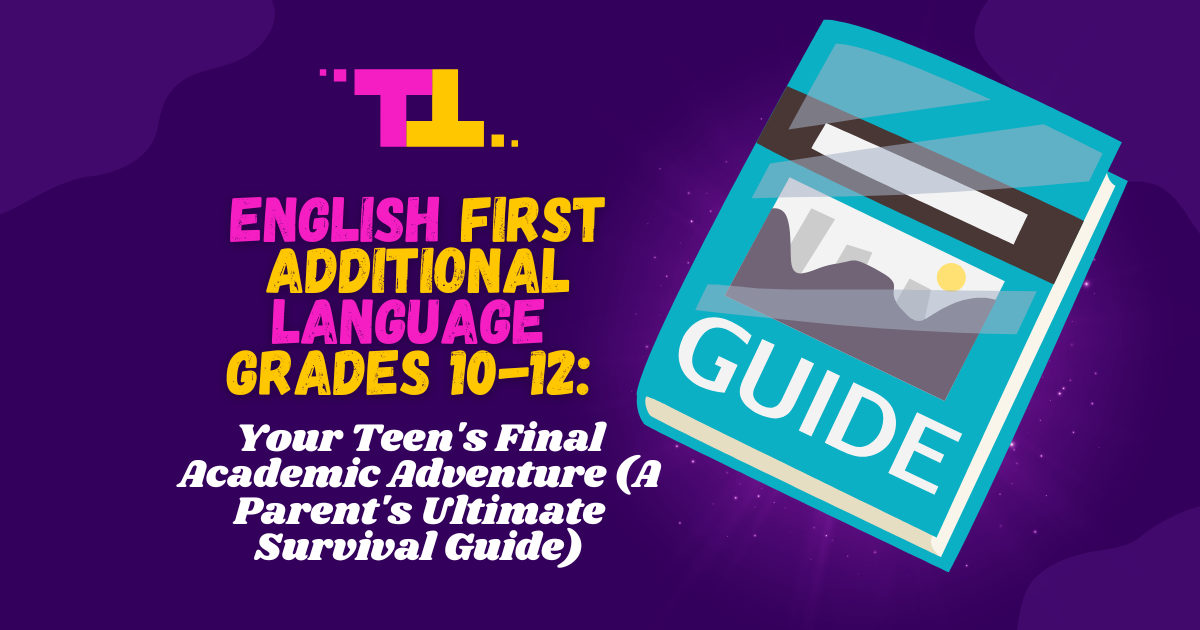English First Additional Language Grades 10-12: Your Teen’s Final Academic Adventure (A Parent’s Ultimate Survival Guide)

Dear Brave Parents of Almost-Adults!
So your teen has made it to the FET phase (that’s Fancy Education Talk for Grades 10-12). They’re probably telling you they’ve got this all figured out. (Spoiler alert: They haven’t.) Let’s decode what they really need to master in these crucial years.
The Foundation: What They Should Already Have
Coming from Grade 9, your teen should be comfortable with:
- Reading 400-450 word texts without having an existential crisis
- Writing structured paragraphs (120-140 words)
- Using punctuation purposefully (not just randomly sprinkling commas like confetti)
- Expressing ideas clearly in writing (beyond “IDK” and “whatever”)
Grade 10: The Reality Check Year
Reading Expectations
- Handle complex texts (around 450-500 words)
- Actually analyze what they read (not just skim and hope for the best)
- Understand different types of texts (because life isn’t just social media posts)
- Start thinking critically (yes, those brain cells need to wake up)
Writing Goals
- Create coherent essays (150-200 words per paragraph)
- Write formal letters that don’t sound like text messages
- Express opinions with actual evidence (not just “because I said so”)
- Use language structures correctly (grammar is not optional anymore)
Grade 11: The Plot Thickens
Reading Level
- Tackle sophisticated texts (500-600 words)
- Read between the lines like a detective
- Understand academic texts (because university is coming)
- Evaluate arguments critically (those debate skills might come in handy)
Writing Skills
- Craft well-structured essays (200-250 words per paragraph)
- Write professionally (future job applications, anyone?)
- Present arguments logically (using actual facts, not just feelings)
- Master formal writing styles (no more emoji replacements for words)
Grade 12: The Final Boss Level
Reading Mastery
- Handle any text type thrown their way (600-700 words)
- Analyze complex arguments
- Understand academic and professional texts
- Read critically and evaluate effectively
Writing Excellence
- Produce polished essays (250-300 words per paragraph)
- Write for any purpose or audience
- Create sophisticated arguments
- Use language with precision and style
Important Reminders
- This is serious business (but panic is optional)
- Every skill builds on previous learning
- Practice is non-negotiable
- Yes, they actually need to read books
How You Can Support (Without Getting Eye Rolls)
- Encourage English use in daily life (Netflix in English counts!)
- Discuss current events (yes, they might actually talk to you)
- Help them find reading material they enjoy (even if it’s not Shakespeare)
- Stay calm when they struggle (remember, you were once a teen too)
Warning Signs to Watch For
- Avoiding reading anything longer than a tweet
- Writing that looks like a text message
- Refusing to use punctuation
- Claiming “grammar isn’t important in real life”
Need help? Questions? Crisis? We’re here for you – no judgment, just support!
Remember: You’re not just helping your teen pass English – you’re preparing them for life after school. And yes, that definitely deserves chocolate! 🍫
Your Partners in Crime at FlippedT
P.S. If your teen claims they “don’t need English because they’re going to be a [insert career here],” remind them that even influencers need to write good captions! 😉
It’s Not Just Us Saying This Stuff!
Look, we love making the English [Home Language/First Additional Language] curriculum fun at FlippedT, but don’t just take our word for it! Here are some official resources (warning: they’re a bit more… formal than we are):
Parent Tip: Don’t let the official documents overwhelm you – that’s exactly why we’re here! We transform these requirements into engaging, achievable learning adventures for your child. 😊
Note: All links were working at the time of publication. Government websites occasionally reorganise their content, so if you find a broken link, just let us know!
